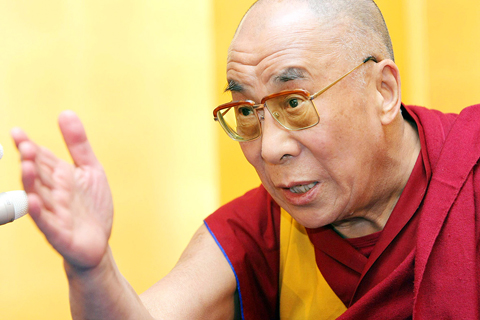Chinese rule is handing down a “death sentence” to Tibetans, the Dalai Lama said yesterday, ahead of a meeting to decide Tibet’s future approach to Beijing.
The region’s exiled leader is on a week-long visit to Japan for talks on spirituality, just as a new round of talks between his envoys and Chinese officials was set to begin, and days after he said he had lost hope of any productive dialogue with Beijing.
“Tibetans are being handed down a death sentence. This ancient nation, with an ancient cultural heritage is dying,” he told a group of reporters.

PHOTO: AFP
“Today, the situation is almost like a military occupation in the entire Tibetan area. It is like we’re under martial law. Fear, terror and lots of political education are causing a lot of grievance,” he said.
The 73-year old Nobel laureate said he was “semi-retiring” because of stalled talks with Beijing, and said he would convene a meeting on Nov. 17 to discuss Tibet’s future approach to dealing with China.
“We will listen to the people’s suggestions, and then I think things will become clear,” he said. “I don’t think I will completely retire, but for the time being while dealing with the Chinese central government, I can no longer take full direct responsibility. My position is completely neutral.”
“Because we believe in democratic principles, the people should express their real feelings. I should not be hindering their opinions,” he said.
The Dalai Lama, who has lived in India since fleeing Tibet in 1959, is a frequent visitor to Japan, where he enjoys an active following. During his stay, he is scheduled to give speeches arranged by a Japanese Buddhist group and Tibetan supporters. He will also visit children and monks.
China accuses the Dalai Lama of trying to split Tibet from Beijing through his travels overseas.
The Dalai Lama’s stated position has been one of seeking meaningful autonomy for Tibet within China. However, last weekend he said he had all but given up hope of reaching a mutually acceptable solution.

The Burmese junta has said that detained former leader Aung San Suu Kyi is “in good health,” a day after her son said he has received little information about the 80-year-old’s condition and fears she could die without him knowing. In an interview in Tokyo earlier this week, Kim Aris said he had not heard from his mother in years and believes she is being held incommunicado in the capital, Naypyidaw. Aung San Suu Kyi, a Nobel Peace Prize laureate, was detained after a 2021 military coup that ousted her elected civilian government and sparked a civil war. She is serving a

China yesterday held a low-key memorial ceremony for the 1937 Nanjing Massacre, with Chinese President Xi Jinping (習近平) not attending, despite a diplomatic crisis between Beijing and Tokyo over Taiwan. Beijing has raged at Tokyo since Japanese Prime Minister Sanae Takaichi last month said that a hypothetical Chinese attack on Taiwan could trigger a military response from Japan. China and Japan have long sparred over their painful history. China consistently reminds its people of the 1937 Nanjing Massacre, in which it says Japanese troops killed 300,000 people in what was then its capital. A post-World War II Allied tribunal put the death toll

‘NO AMNESTY’: Tens of thousands of people joined the rally against a bill that would slash the former president’s prison term; President Lula has said he would veto the bill Tens of thousands of Brazilians on Sunday demonstrated against a bill that advanced in Congress this week that would reduce the time former president Jair Bolsonaro spends behind bars following his sentence of more than 27 years for attempting a coup. Protests took place in the capital, Brasilia, and in other major cities across the nation, including Sao Paulo, Florianopolis, Salvador and Recife. On Copacabana’s boardwalk in Rio de Janeiro, crowds composed of left-wing voters chanted “No amnesty” and “Out with Hugo Motta,” a reference to the speaker of the lower house, which approved the bill on Wednesday last week. It is

FALLEN: The nine soldiers who were killed while carrying out combat and engineering tasks in Russia were given the title of Hero of the Democratic People’s Republic of Korea North Korean leader Kim Jong-un attended a welcoming ceremony for an army engineering unit that had returned home after carrying out duties in Russia, North Korean state media KCNA reported on Saturday. In a speech carried by KCNA, Kim praised officers and soldiers of the 528th Regiment of Engineers of the Korean People’s Army (KPA) for “heroic” conduct and “mass heroism” in fulfilling orders issued by the ruling Workers’ Party of Korea during a 120-day overseas deployment. Video footage released by North Korea showed uniformed soldiers disembarking from an aircraft, Kim hugging a soldier seated in a wheelchair, and soldiers and officials